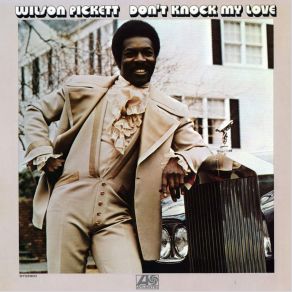Don't Knock My Love
Download links and information about Don't Knock My Love by Wilson Pickett. This album was released in 1971 and it belongs to Hip Hop/R&B, Soul, Rock, Theatre/Soundtrack genres. It contains 12 tracks with total duration of 36:56 minutes.

|
|
|---|---|
| Artist: | Wilson Pickett |
| Release date: | 1971 |
| Genre: | Hip Hop/R&B, Soul, Rock, Theatre/Soundtrack |
| Tracks: | 12 |
| Duration: | 36:56 |
| Buy it NOW at: | |
| Buy on iTunes $7.99 | |
| Buy on Amazon $7.99 | |
Tracks
[Edit]| No. | Title | Length |
|---|---|---|
| 1. | Fire and Water | 3:38 |
| 2. | A Mighty Long Way | 3:08 |
| 3. | Covering the Same Old Ground | 3:13 |
| 4. | Don't Knock My Love, Pt. 1 (Remastered Single Version) | 2:16 |
| 5. | Don't Knock My Love, Pt. 2 (Remastered Single Version) | 4:05 |
| 6. | Call My Name, I'll Be There | 2:25 |
| 7. | Hot Love | 3:11 |
| 8. | Not Enough Love to Satisfy | 2:59 |
| 9. | You Can't Judge a Book By It's Cover | 2:51 |
| 10. | Pledging My Love | 3:20 |
| 11. | Mama Told Me Not to Come | 2:51 |
| 12. | Woman Let Me Down Home | 2:59 |
Details
[Edit]Wilson Pickett's eleventh and final album for the Atlantic label is yet another example of why the ultimate pop-soul singer was not only a consistent hitmaker time after time, but was able to adapt and change with the times, covering tunes a lesser singer would not dare try. By the occasion of this 1971 date, disco was starting to rear its head, and Pickett picked up on the trend while still retaining his native Alabama and longtime Detroit roots. After many years working with bands from the Motor City or Memphis, the singer had just collaborated with the Kenneth Gamble/Leon Huff team in Philadelphia, then returned here to record at the legendary Muscle Shoals studio in 'Bama, bringing string arranger Wade Marcus, background vocal arranger Dave Crawford, Detroit session guitarist nonpareil Dennis Coffey (spelled wrong as Coffee on the credits, corrected in Gene Sculatti's excellent updated liner notes) and the Memphis Horns. As he was not much of a songwriter in this latter period of his career, Pickett was fond of covering tunes done by British or American rockers and friends from the Southern soul scene, hoping a couple of them would stick on the charts, which they usually did. For the most part, these tracks segue into each other, a nightmare for radio or club DJs, and a most peculiar trait of this straight CD reissue. Pickett's two-part title track is half funky rock & roll, half weird synth-drizzled disco instrumental, all with an out-of-tune electric bass guitar from David Hood, though qualified with the lyric "if you don't like it, don't knock it". The slow-burning "Hot Love" showcases the most action from a potent horn section over amorous lyric references, Marcus and Crawford exploit the strings and female vocal backup on the ballad "Pledging My Love," while the anti-climactic "Woman Let Me Be Down Home" is listless lyrically and musically. The highlights include a version of "Fire & Water" originally done by Paul Rodgers (and co-composer Andy Fraser) of Free before the singer headed up Bad Company. Pickett jumps head first into this classic rock tune-turned-soulful song loaded up with clavinet sounds — it would have been a kick to hear the wicked one cover Free's other big hit, "The Stealer". Randy Newman's "Mama Told Me Not to Come" from the book of Three Dog Night is so much better in the soul sender's hands, almost campy and somewhat humorous. Stevie Wonder's minor hit "You Can't Judge a Book by Its Cover" is done in Pickett's comfort zone similar to his big Philly-based hit "Engine Engine #9," alright in this instance, but not spectacular, instead more watered down. The hardest-driving numbers are "A Mighty Long Way" featuring Pickett's harmonica playing, and the straight pop-funk of "Call My Name, I'll Be There" with a somewhat cliché lyric post-Damita Jo or the Jackson Five, with Coffey's thorny guitar as a focal point. "Covering the Same Old Ground" is the downhearted blues Pickett was always capable of doing, but is marred by the syrupy strings. A high point on every track is the spot-on drumming of Roger Hawkins and keyboardist Barry Beckett, nuclei of the true Muscle Shoals sound. This is a recording yielding mixed results, and considering this is the end of his initial prime period as a top drawer R&B icon, understandable that it's not his best, even though there are many redeeming moments for his still great vocal talent. ~ Michael G. Nastos, Rovi